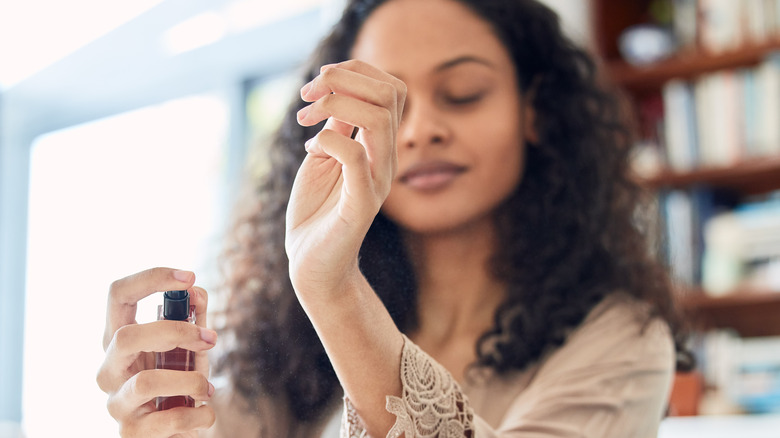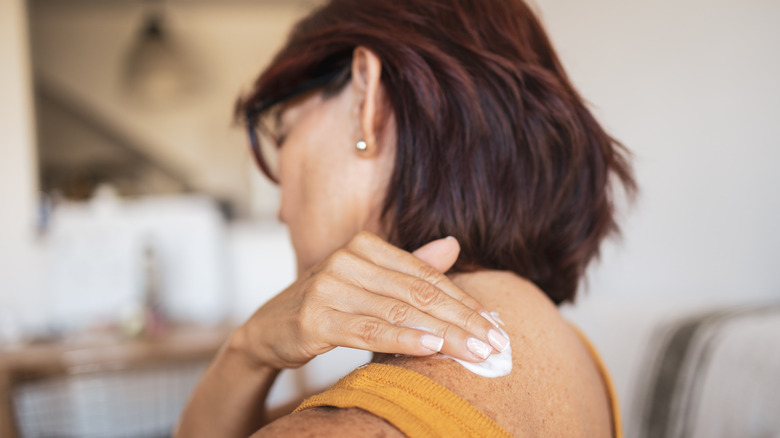The Up-And-Coming Mosquito Repellent That May Be Able To Prevent Itchy Bites
Getting bitten by mosquitos is an often irritating side effect of being out and about in the summer. In addition to the itchy bites, though, mosquitos are also one of the deadliest insects in the world, spreading diseases like malaria, dengue, yellow fever, and Zika. In fact, according to the Centers for Disease Control and Prevention, these long-legged, tiny, flying bugs kill more people than any other animal in the world.
This is one of the reasons why a company called DSM-Firmenich is working on developing an up-and-coming mosquito repellent that could be more effective than traditional bug sprays like DEET. The company's goal is to find a scent that keeps mosquitos at bay and incorporate it into everyday household products like bar soap, laundry detergent, and body lotions. They're doing this by testing perfumes that might get the job done (per World Economic Forum).
Matthew Rogers, Senior Vice President, Chemosensory Sciences, at DSM-Firmenich, told Bill Gates, "The mosquito can be considered a flying nose ... What it's smelling tells the mosquito what's important, where to locate human blood meal to feed, where to lay eggs, and what to avoid." So, the people at this beauty innovation company are looking to the fragrance world for answers.
Using perfumes to repel mosquitos isn't a new idea
The idea of using perfumes to prevent itchy bites from mosquitos isn't necessarily a new one. Essential oils that contain citronella, geranium, and peppermint are just some of the more natural insect repellents out there (per Web MD).
You might also recall the TikTok hack that promoted the use of Victoria's Secret Bombshell and Amber Romance perfumes to repel mosquitos. The trend originated from a 2015 study in the Journal of Insect Science that was done on the subject, which seemed to indicate that Victoria's Secret Bombshell kept the flying insects away for up to 120 minutes. However, according to the entomology collections manager at the Smithsonian National Museum of Natural History, Floyd W. Shockley (via Allure), this study was probably successful because a larger-than-usual amount of perfume was used. Participants' hands were coated in 0.5 milliliters of the stuff while what someone would typically spray on themselves might be just 0.1 milliliters, according to Shockley.
Shockley also added that what could've happened is a mere masking of smell so that the mosquito couldn't smell you. "Remember that female mosquitoes base their feeding decisions on heat, carbon dioxide, and smell. So, if you use enough [perfume] then mosquitoes won't 'see' you as a potential host because you won't smell right," explained Shockley. The efforts by DSM-Firmenich differ in a few ways, however.
It's about finding a mosquito repellent that's long-lasting
Essential oils like citronella need to be reapplied throughout the day for them to be effective, per Healthline. By incorporating scents that repel mosquitos into everyday products, the people at DSM-Firmenich hope to offer an additional and longer-lasting layer of protection.
"We want to build in the motivation to use these products because you enjoy them, but at the same time, you're protecting yourself against the mosquito," explained Matthew Rogers to Bill Gates. The researchers experimented by using the classic arm-in-cage test where volunteers were asked to insert their arms (after the perfume was applied to it) into a cage filled with mosquitos. The scent was considered inefficient when two mosquitos landed on the arm (via Bill Gates). So far, they've uncovered that lily-of-the-valley seemed promising as a scent, per World Economic Forum. In fact, it was as efficient as DEET, the N,N-diethyl-meta-toluamide repellent, in preventing itchy bites. The floral sweet notes of this fragrance are already a part of many beauty and self-care products. The key, now, might be finding out just how much of it needs to go into everyday products to keep mosquitos away.
Whether or not this up-and-coming science will work as a long-lasting mosquito repellent is left to be seen. But it does prove that there are unexpected mosquito repellents out there still waiting to be discovered. "If we're successful, I think it will make an enormous difference for the most vulnerable populations in the developing world," added Rogers.



